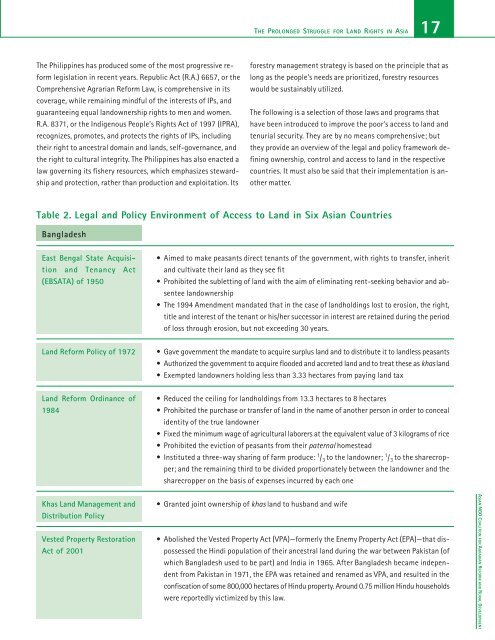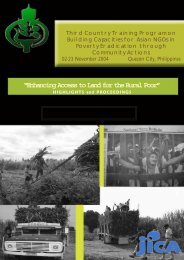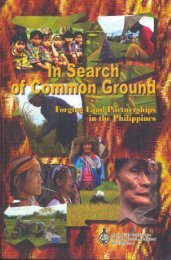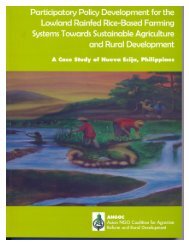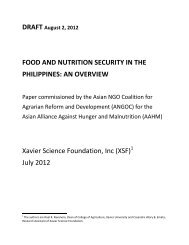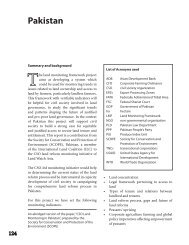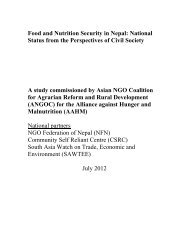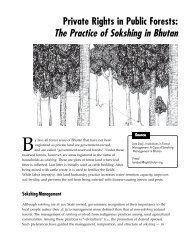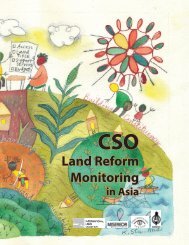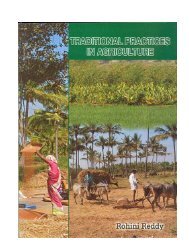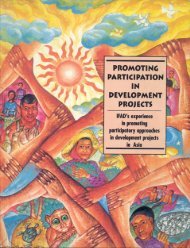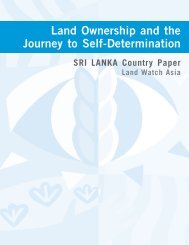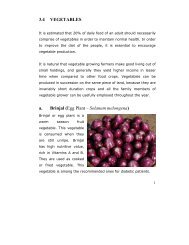Securing the Right to Land FULL - ANGOC
Securing the Right to Land FULL - ANGOC
Securing the Right to Land FULL - ANGOC
Create successful ePaper yourself
Turn your PDF publications into a flip-book with our unique Google optimized e-Paper software.
The Philippines has produced some of <strong>the</strong> most progressive reform<br />
legislation in recent years. Republic Act (R.A.) 6657, or <strong>the</strong><br />
Comprehensive Agrarian Reform Law, is comprehensive in its<br />
coverage, while remaining mindful of <strong>the</strong> interests of IPs, and<br />
guaranteeing equal landownership rights <strong>to</strong> men and women.<br />
R.A. 8371, or <strong>the</strong> Indigenous People’s <strong>Right</strong>s Act of 1997 (IPRA),<br />
recognizes, promotes, and protects <strong>the</strong> rights of IPs, including<br />
<strong>the</strong>ir right <strong>to</strong> ancestral domain and lands, self-governance, and<br />
<strong>the</strong> right <strong>to</strong> cultural integrity. The Philippines has also enacted a<br />
law governing its fishery resources, which emphasizes stewardship<br />
and protection, ra<strong>the</strong>r than production and exploitation. Its<br />
Bangladesh<br />
East Bengal State Acquisition<br />
and Tenancy Act<br />
(EBSATA) of 1950<br />
<strong>Land</strong> Reform Policy of 1972<br />
<strong>Land</strong> Reform Ordinance of<br />
1984<br />
Khas <strong>Land</strong> Management and<br />
Distribution Policy<br />
Vested Property Res<strong>to</strong>ration<br />
Act of 2001<br />
THE PROLONGED STRUGGLE FOR LAND RIGHTS IN ASIA<br />
17<br />
forestry management strategy is based on <strong>the</strong> principle that as<br />
long as <strong>the</strong> people’s needs are prioritized, forestry resources<br />
would be sustainably utilized.<br />
The following is a selection of those laws and programs that<br />
have been introduced <strong>to</strong> improve <strong>the</strong> poor’s access <strong>to</strong> land and<br />
tenurial security. They are by no means comprehensive; but<br />
<strong>the</strong>y provide an overview of <strong>the</strong> legal and policy framework defining<br />
ownership, control and access <strong>to</strong> land in <strong>the</strong> respective<br />
countries. It must also be said that <strong>the</strong>ir implementation is ano<strong>the</strong>r<br />
matter.<br />
Table 2. Legal and Policy Environment of Access <strong>to</strong> <strong>Land</strong> in Six Asian Countries<br />
Aimed <strong>to</strong> make peasants direct tenants of <strong>the</strong> government, with rights <strong>to</strong> transfer, inherit<br />
and cultivate <strong>the</strong>ir land as <strong>the</strong>y see fit<br />
Prohibited <strong>the</strong> subletting of land with <strong>the</strong> aim of eliminating rent-seeking behavior and absentee<br />
landownership<br />
The 1994 Amendment mandated that in <strong>the</strong> case of landholdings lost <strong>to</strong> erosion, <strong>the</strong> right,<br />
title and interest of <strong>the</strong> tenant or his/her successor in interest are retained during <strong>the</strong> period<br />
of loss through erosion, but not exceeding 30 years.<br />
Gave government <strong>the</strong> mandate <strong>to</strong> acquire surplus land and <strong>to</strong> distribute it <strong>to</strong> landless peasants<br />
Authorized <strong>the</strong> government <strong>to</strong> acquire flooded and accreted land and <strong>to</strong> treat <strong>the</strong>se as khas land<br />
Exempted landowners holding less than 3.33 hectares from paying land tax<br />
Reduced <strong>the</strong> ceiling for landholdings from 13.3 hectares <strong>to</strong> 8 hectares<br />
Prohibited <strong>the</strong> purchase or transfer of land in <strong>the</strong> name of ano<strong>the</strong>r person in order <strong>to</strong> conceal<br />
identity of <strong>the</strong> true landowner<br />
Fixed <strong>the</strong> minimum wage of agricultural laborers at <strong>the</strong> equivalent value of 3 kilograms of rice<br />
Prohibited <strong>the</strong> eviction of peasants from <strong>the</strong>ir paternal homestead<br />
Instituted a three-way sharing of farm produce: 1 /3 <strong>to</strong> <strong>the</strong> landowner; 1 /3 <strong>to</strong> <strong>the</strong> sharecropper;<br />
and <strong>the</strong> remaining third <strong>to</strong> be divided proportionately between <strong>the</strong> landowner and <strong>the</strong><br />
sharecropper on <strong>the</strong> basis of expenses incurred by each one<br />
Granted joint ownership of khas land <strong>to</strong> husband and wife<br />
Abolished <strong>the</strong> Vested Property Act (VPA)—formerly <strong>the</strong> Enemy Property Act (EPA)—that dispossessed<br />
<strong>the</strong> Hindi population of <strong>the</strong>ir ancestral land during <strong>the</strong> war between Pakistan (of<br />
which Bangladesh used <strong>to</strong> be part) and India in 1965. After Bangladesh became independent<br />
from Pakistan in 1971, <strong>the</strong> EPA was retained and renamed as VPA, and resulted in <strong>the</strong><br />
confiscation of some 800,000 hectares of Hindu property. Around 0.75 million Hindu households<br />
were reportedly victimized by this law.<br />
ASIAN NGO COALITION FOR AGRARIAN REFORM AND RURAL DEVELOPMENT


